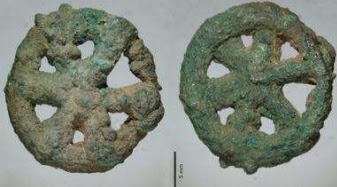-- eraka 'knave of wheel' rebus: arka, aka 'gold, copper'; eraka 'metal infusion'
This is an adddendum to: One-horned young bull PLUS spoked wheel signifies कोंद kōnda ‘engraver, turner' and akṣaracaṇa 'scribe' working with eraka 'knave of wheel' rebus 'molten cast, metal infusion' https://tinyurl.com/y2ongqg6
Image may be NSFW.
Clik here to view.
Mehergarh, 5th millennium BCE. 2.2 cm dia. 5 mm reference scale. Perhaps coppper alloyed with lead. It is remarkable, that this six-spolked cire perdue copper alloy wheels made in Mehrgarh becomes a hieroglyph of Indus Script on Dholavira signboard.
Theorthography of these cire perdue spoked wheel shapes may be read rebus: āre potter's wheel (Gondi) rebus: āra 'brass'.
I suggest that theseMehrgarh artifacts provide the model for the Sign used on Indus Script Corpora.
The spoked wheel on the neck of the young bull (Field symbol 3 on a Mohenjo-daro seal) is composed of two semantic components: circle, spokes.
1. āre potter's wheel (Gondi) rebus āra'brass'.
2. The semantics of spoke are signified by the word ara. अर m. the spoke or radius of a wheel RV.(Monier-Williams).
Image may be NSFW.
Clik here to view. Field Symbol 3 [ASI 1977 Concordance (Mahadevan)]
Field Symbol 3 [ASI 1977 Concordance (Mahadevan)]
Clik here to view.
 Field Symbol 3 [ASI 1977 Concordance (Mahadevan)]
Field Symbol 3 [ASI 1977 Concordance (Mahadevan)]One-horned young bull hypertext/hyperimage signifies a goldsmith, lapidary: कोंद kōnda ‘young bull' कोंद kōnda ‘engraver, turner'. कुलालादिकन्दुः f. a kiln; a potter's kiln; kō̃da कोँद 'potter's kiln' (Kashmiri) Thus, an iron turner (in smithy/forge).
I suggest that the orthography of six spokes of the wheel is intended to reinforce the semantics of अर ara ‘spoke of a wheel’ reinforced by a homonym āre‘potter’s wheel’. The shape of circle suggested by the word āra 1 आर । वलयीकरणम् m. the act of encircling, surrounding, enclosing; standing in a circle (of a number) of people (Śiv. 947); a necklace (K.Pr. 143). āru आरु । मण्डलीकरणम् m. the standing of a number of people in a circle; a circle of people. ālakŏnḍul आलक्वण्डु॒ल् । कुण्डलाङ्कः m. (sg. dat. ālakŏnḍalas आलक्वण्डलस् , pl. nom. ālakŏnḍal आलक्वण्डल् ), a circle, a circular mark; the inner, circular, earthenware receptacle of the kāngrī or portable brazier. örü 3 आ॑रू॒ । वेष्टनम् f. encircling; a circle, band, fillet; a ring (as of rope, or as formed by a snake lying curled up); a wisp of straw or grass, bound in a ring, for supporting round-bottomed vessels so as to prevent their overturning. Cf. āra 1 and āru. -pörü -पा॑रू॒ । परित आवरणम् f. surrounding a person to prevent his departure, forming a circle of people round him, crowding round a person. (Kashmiri) hāra2 m. ʻ necklace ʼ MBh., ˚aka -- m. ʻ string of pearls ʼ Pañcat. Pk. hāra -- m. ʻ garland ʼ, hāri -- f. ʻ line ʼ; K. āra m. ʻ necklace ʼ, āru m. ʻ circle of people ʼ, örü f. ʻ circle, band, fillet ʼ(CDIAL 14059) څرخ ṯs̱arḵẖ, s.m. (2nd) A wheel (particularly a potter's, or of a water-mill or well). 2. A grindstone. 3. Circular motion, turn, revolution, the act of turning. 4. Fortune, chance. 5. The heavens, the sphere, the celestial globe. (Pashto)
Ta. ār̤i circle, ring, wheel, discus weapon. Ma. ār̤i roundness (as of disk, ring, etc.); funeral pile. Ka. ār̤i roundness, a circle, a discus; āṇi roundness. Te. āṇi spherical, round, globular (applied to pearls). ? Go. (SR.) āre potter's wheel (Voc. 138).(DEDR 398)
A second overlay of semantics relates to the orthographic emphasis on the knave of the wheel. This yields eraka ‘knave of wheel’ rebus: arka, aka, aga ‘copper, gold’ as in akasāla ‘goldsmith’s shop’ (Kannada); అగసాలి or అగసాలెవాడు agasāli. [Tel.] n. A goldsmith. కంసాలివాడు (Telugu); arukkam அருக்கம் 1 arukkam , n. < arka. (நாநார்த்த .) 1. Copper; செம்பு (Tamil); eraka 'metal infusion': Ta. eṟṟu (eṟṟi-) to throw out (as water from a vessel); iṟai (-v-, -nt-) to scatter (intr.), disperse; (-pp-, -tt-) to splash (tr.), spatter, scatter, strew, draw and pour out water, irrigate, bale out, squander; iṟaivai receptacle for drawing water for irrigation; iṟaṭṭu (iṟaṭṭi-) to sprinkle, splash. Ma. iṟekka to bale out; iṟayuka id., scatter, disperse; iṟava basket for drawing water; eṟiccil rainwater blown in by the wind. To. eṟ- (eṟQ -) to scoop up (water with vessel). Ka. eṟe to pour any liquids, cast (as metal); n. pouring; eṟacu, ercu to scoop, sprinkle, scatter, strew, sow; eṟaka, eraka any metal infusion; molten state, fusion. Tu. eraka molten, cast (as metal); eraguni to melt. Kur. ecchnā to dash a liquid out or over (by scooping, splashing, besprinkling). Cf. 840 Kur. elkhnā (Pfeiffer). (DEDR 866)
